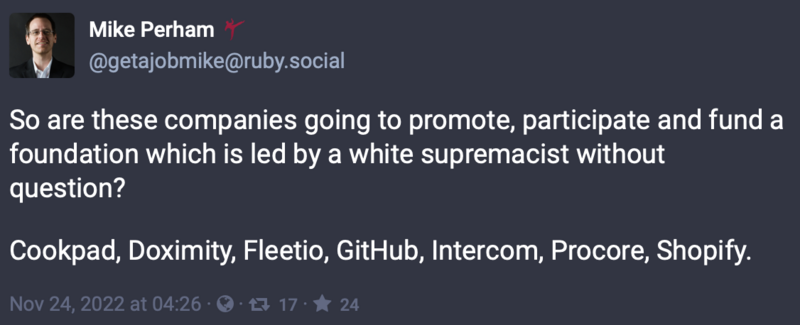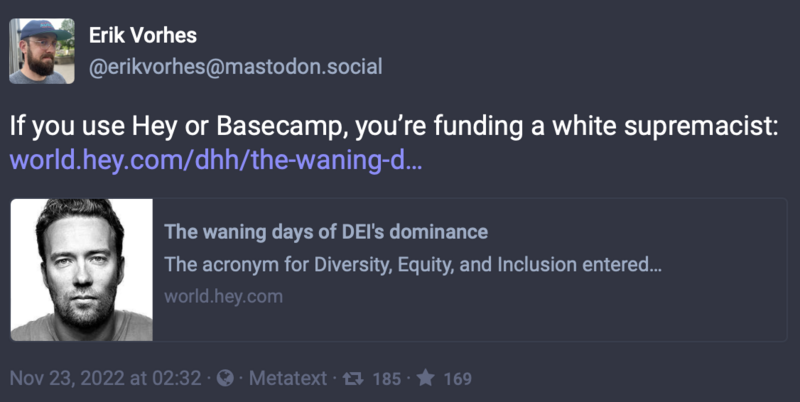John McWhorter's new book Woke Racism ends with with plea to all of those who haven't been taken in by what he calls "The New Religion". Especially if they find themselves accused of being a "racist" after daring to dissent on any racially-charged topics:
We must say no to these people, in quest of a result: An understanding will gradually coalesce among them that they need to step up their game, or, better, step it down. A communal realization will set in, after a while even explicitly acknowledged by its unofficial leaders, that shaming isn’t working anymore. Again, yes, it can be hard to be called a racist even if you know you aren’t one, just as we shudder at the thought of being called pedophiles or climate deniers.
It is natural to fear going up against the parishioners who so fervently disagree, with their ten-dollar words and artful sarcasm and air of surety. But I promise you: There is room in this society for speaking the truth and living to tell about it.
If you aren't familiar with McWhorter's work, you can start with his short interview on Bill Maher, then proceed to his excellent biweekly appearances with Glenn Loury.
His diagnosis of our time is at once piercing and fortifying. He prepares you for the shock that might come from baselessly being called a "racist" or a "white supremacist" for the first time. Which can happen easier than you might think, if you, say, dare venture an opinion on the slice of contemporary corporate politics that intersect with race in a way that isn't pre-approved by, as McWhorter labels them, The Elect.
He also helps you realize that after the shock of being accused without cause of being a "racist" or a "white supremacist" once, it just doesn't have the same effect the next time. The shock value rapidly diminishes exactly because it is such a serious charge. One that can't be sustained if the accusation isn't plugged into reality. Neither with the target or the spectators.
I remembered McWhorter's words when someone sent me the following, err, feedback on my post about DEI:
There was that indicting label, "white supremacist", but also the transitive guilt that so often follows it. Anyone associated with the accused is also to be tarred, lest they produce denunciations!
Transitive guilt is a terrifying tactic the first time you encounter it. Not only are you being accused of something awful, but the accusation is supercharged to run through your connections to others. People who are likely to be equally mortified, and perhaps even paralyzed, by the second degree charge. So you're not only required to hold your own line, you also have to hold it for everyone else, or you will have brought a pox upon their houses too.
No wonder most people don't have the stomach for facing these tactics, and either resign themselves to silence or worse. But that's exactly when they ought to remember McWhorter's words. That by refusing to bow to these tactics, they will inevitably lose their terror.
Which was half the point of that DEI analysis. That the power of these tactics has already weakened tremendously since 2020. They've simply been used in vain too many times. This latest reaction is a great example of just that. What a year or two ago might have been A Really Big Deal is now barely a twirl in a teapot.
There is room in this society for speaking the truth and living to tell about it, indeed.
Transitive guilt is a terrifying tactic the first time you encounter it. Not only are you being accused of something awful, but the accusation is supercharged to run through your connections to others. People who are likely to be equally mortified, and perhaps even paralyzed, by the second degree charge. So you're not only required to hold your own line, you also have to hold it for everyone else, or you will have brought a pox upon their houses too.
No wonder most people don't have the stomach for facing these tactics, and either resign themselves to silence or worse. But that's exactly when they ought to remember McWhorter's words. That by refusing to bow to these tactics, they will inevitably lose their terror.
Which was half the point of that DEI analysis. That the power of these tactics has already weakened tremendously since 2020. They've simply been used in vain too many times. This latest reaction is a great example of just that. What a year or two ago might have been A Really Big Deal is now barely a twirl in a teapot.
There is room in this society for speaking the truth and living to tell about it, indeed.

